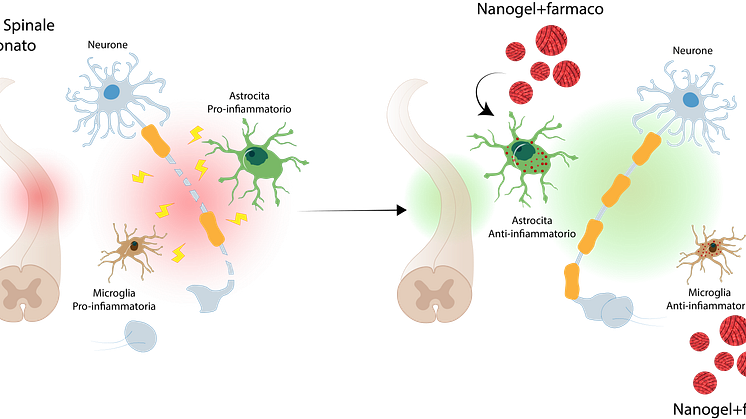
Press release -
Nanomedicine paves the way for new treatments for spinal cord injury
A Study by Politecnico di Milano and Istituto Mario Negri has been published in Advanced Materials
Milan, 14 February -In a study published in Advanced Materials, researchers Pietro Veglianese, Valeria Veneruso and Emilia Petillo from Istituto di Ricerche Farmacologiche Mario Negri IRCCS in collaboration with Filippo Rossi of the Politecnico di Milano have demonstrated that an innovative nanovector (nanogel), which they developed, is able to deliver anti-inflammatory drugs in a targeted manner into glial cells actively involved in the evolution of spinal cord injury, a condition that leads to paraplegia or quadriplegia.
Treatments currently available to modulate the inflammatory response mediated by the component that controls the brain's internal environment after acute spinal cord injury showed limited efficacy. This is also due to the lack of a therapeutic approach that can selectively act on microglial and astrocytic cells.
The nanovectors developed by Politecnico di Milano, called nanogels, consist of polymers that can bind to specific target molecules. In this case, the nanogels were designed to bind to glial cells, which are crucial in the inflammatory response following acute spinal cord injury. The collaboration between Istituto di Ricerche Farmacologiche Mario Negri IRCCS and Politecnico di Milano showed that nanogels, loaded with a drug with anti-inflammatory action (rolipram), were able to convert glial cells from a damaging to a protective state, actively contributing to the recovery of injured tissue. Nanogels showed to have a selective effect on glial cells, releasing the drug in a targeted manner, maximising its effect and reducing possible side effects.
"The key to the research was understanding the functional groups that can selectively target nanogels within specific cell populations”, explains Filippo Rossi, professor at the Department of Chemistry, Materials and Chemical Engineering 'Giulio
Natta' at Politecnico di Milano - This makes it possible to optimise drug treatments by reducing unwanted effects”.
“The results of the study”, continues Pietro Veglianese, Head of the Acute Spinal Trauma and Regeneration Unit, Department of Neuroscience at Istituto Mario Negri, “show that nanogels reduced inflammation and improved recovery capacity in animal models with spinal cord injury, partially restoring motor function. These results open the way to new therapeutic possibilities for myelolysis patients. Moreover, this approach may also be beneficial for treating neurodegenerative diseases such as Alzheimer's, in which inflammation and glial cells play a significant role”.
Link to the paper https://onlinelibrary.wiley.com/doi/abs/10.1002/adma.202307747
Topics
Politecnico di Milano is a scientific-technological university which trains engineers, architects and industrial designers.
The University has always focused on the quality and innovation of its teaching and research, developing a fruitful relationship with business and productive world by means of experimental research and technological transfer.
Research has always been linked to didactics and it is a priority commitment which has allowed Politecnico Milano to achieve high quality results at an international level as to join the university to the business world. Research constitutes a parallel path to that formed by cooperation and alliances with the industrial system.
Knowing the world in which you are going to work is a vital requirement for training students. By referring back to the needs of the industrial world and public administration, research is facilitated in following new paths and dealing with the need for constant and rapid innovation. The alliance with the industrial world, in many cases favored by Fondazione Politecnico and by consortiums to which Politecnico belong, allows the university to follow the vocation of the territories in which it operates and to be a stimulus for their development.
The challenge which is being met today projects this tradition which is strongly rooted in the territory beyond the borders of the country, in a relationship which is developing first of all at the European level with the objective of contributing to the creation of a single professional training market. Politecnico takes part in several research, sites and training projects collaborating with the most qualified European universities. Politecnico's contribution is increasingly being extended to other countries: from North America to Southeast Asia to Eastern Europe. Today the drive to internationalization sees Politecnico Milano taking part into the European and world network of leading technical universities and it offers several courses beside many which are entirely taught in English.


